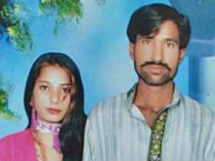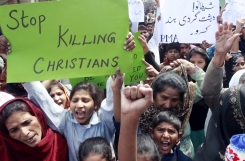Christian leaders in Pakistan have received death threats for their involvement in church planting, leading a country expert to warn that religious minorities are facing worse conditions day by day.
Javed David has been building churches in poor communities for the past two years, but says he is becoming increasingly afraid of the consequences, particularly in the wake of the double suicide bomb attacks on churches in Lahore, where he lives, in March.
"After the tragedy in Youhanabad [a Christian majority suburb of Lahore], circumstances have changed and now there is more fear," David told Asia News. He has personally received two threats on his life since February. Once, a motorcyclist threw a piece of paper though his car window, reading: "This is an Islamic nation. We cannot allow church building. Either you convert to Islam or you leave this country! Stop building churches or you'll pay the consequences!"
In a second incident on April 4, another motorcyclist told him: "We know what you are doing here. Stop building churches. Convert to Islam, which is the true religion. Otherwise we will make a horrible example of you."
One of David's colleagues, Ata-ur-Rehman, has also received threats. He said that though there has been some resistance from members of the local Muslim community, Christians and Muslims largely live in peace together. He did, however, express concern about "rising religious intolerance".
"My family and I are scared and worried because I continue to receive threats," David added. "Where can we go to enjoy religious freedom? This is our country; we have lived here for generations."
"Still, I dedicated my life to Christ and I shall continue to serve His people, no matter what happens."
Pakistan has long struggled with discrimination against religious minorities, and a report released in December last year said an "oppressive environment" was making it "increasingly difficult for many religious communities to live securely and free from danger in places where they have often spent the majority of their lives."
The Minority Rights Group and International and Sustainable Development Policy Institute said that "violent attacks against religious minorities occur against a backdrop of legal and social discrimination in almost every aspect of their lives, including political participation, marriage and freedom of belief," and called for increased protections for all citizens.
The US Commission on International Religious Freedom (USCIRF) then two weeks ago urged the Obama Administration to designate Pakistan a "country of particular concern" and also blamed the Pakistani government for failing to provide adequate protection to targeted groups.
"Pakistan's legal environment is particularly repressive due to its religiously discriminatory constitutional provisions and legislation, including its blasphemy laws," the USCIRF's annual report said.
"The government failed to protect citizens, minority and majority alike, from sectarian and religiously-motivated violence, and Pakistani authorities have not consistently brought perpetrators to justice or taken action against societal actors who incite violence."
The blasphemy laws in particular have been blamed for increasing inter-religious tensions across the country. Human rights groups say that the laws are frequently misused by extremists, and false charges brought against Christians in order to settle personal scores or to seize property or businesses. Perhaps the most infamous case is that of Asia Bibi, a Christian woman accused of blasphemy and now facing the death penalty. Her case made global headlines after two prominent politicians were assassinated after trying to help her.
Taliban splinter group Jundullah have claimed responsibility for several high profile attacks on religious groups in Pakistan. In February 2012, 18 Shia Muslims were killed by the Sunni militants in Kohistan, and the group also claimed to be behind the September 213 twin suicide bomb attack at All Saints Church in Peshawar which caused at 115 deaths. It was the deadliest attack on Christians in the country's history.
Today, Jundallah's spokesman Admed Marwat told Reuters that the group was responsible for an attack on a bus in the southern city of Karachi, killing at least 43 people.
"These killed people were Ismaili and we consider them kafir (non-Muslim). We had four attackers. In the coming days we will attack Ismailis, Shi'ites and Christians," Marwat said.
Mehwish Bhatti, Pakistan officer for the British Pakistani Christian Association (BPCA), told Christian Today that death threats against Christians are very common in the country. Based in Lahore, Bhatti said that her own uncle was threatened with jail when he tried to build a church near a mosque.
Religious freedoms granted by the government "are only confined in words," Bhatti said. "That's not the real story that we're facing". Forced marriages are very common, she added, noting that many girls are abandoned or even killed by their Muslim husbands if they refuse to submit to Islamic teaching.
Bhatti also said that any government protections given in the wake of incidents such as the church bombings in Youhanabad are short lived. "Our lives are in danger. The government send higher-level security for one or two weeks, just for media coverage, but [there are] no long term measures."
Persecution against Christians is "increasing day by day," Bhatti finished. In two days time, she will deal with a case of a man beaten by Muslims; "we have so many [similar] cases in Lahore."
"What is really happening is that Lahore has become a danger zone for Christians," she said. "Every day, Christians are being targeted, and treated with hatred."
















